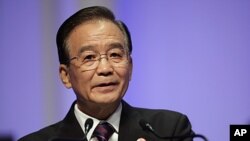Chinese Premier Wen Jiabao is due to arrive in Saudi Arabia Saturday amid fears that tighter international sanctions on Iran’s oil industry may affect China’s energy imports.
Full details of Premier Wen’s six-day visit to the Middle East, which will also take him to the oil exporting nations of the United Arab Emirates and Qatar, are still unknown, but securing energy supplies to meet growing Chinese demand is expected to top the agenda.
China’s booming economy has become dependent on foreign oil, with 11 percent of imports coming from Iran.
The United States on Wednesday called on China - the largest buyer of Iranian crude - to reduce its purchases as part of a bid to force Iran to abandon its nuclear program. The West says Iran's nuclear program is aimed at building weapons, but Iran says it is for peaceful purposes.
Chinese officials have criticized the “unilateral” efforts of the United States to impose further sanctions on Iran. However, most analysts, like Christian Koch from the Gulf Research Center, say if China were to cooperate with the U.S. in the future, it would partly depend on assurances from Gulf countries that they would accommodate the extra oil demand that would ensue.
Increasingly weary of Iran’s nuclear aspirations, Saudi Arabia recently announced that it has the capacity to meet global needs if new sanctions stop Iranian oil from flowing.
"The Saudis will certainly prove themselves amendable to discussing possibly increased levels of exports to China, so that’s what the premier is going to be looking for," said Koch.
China has a history of opposing outside intervention in foreign countries, but it eventually supported last year’s opposition movement in Libya. According to Shaun Breslin, professor of politics and international studies at Warwick University, such support could mean Chinese authorities take similar stances on matters of foreign policy in the future.
"They want to be seen as a responsible power and they’re aware that if they’re seen as being in some way irresponsible, that this can have negative impacts on other economic goals."
In addition to pressure from the U.S., Wen’s visit to the Gulf also follows recent threats by Iran to close the Strait of Hormuz in response to more sanctions.
Almost a fifth of all oil traded worldwide passes through the strategic waterway, including about a third of Chinese oil imports.
China is expected to sign a joint venture deal in the coming days to develop a refinery on Saudi Arabia’s Red Sea Coast, allowing tankers to bypass the Strait of Hormuz.
Chinese officials say Wen will not visit Iran during his Middle East trip.
China’s Wen Visits Middle East Amid Energy Concerns




